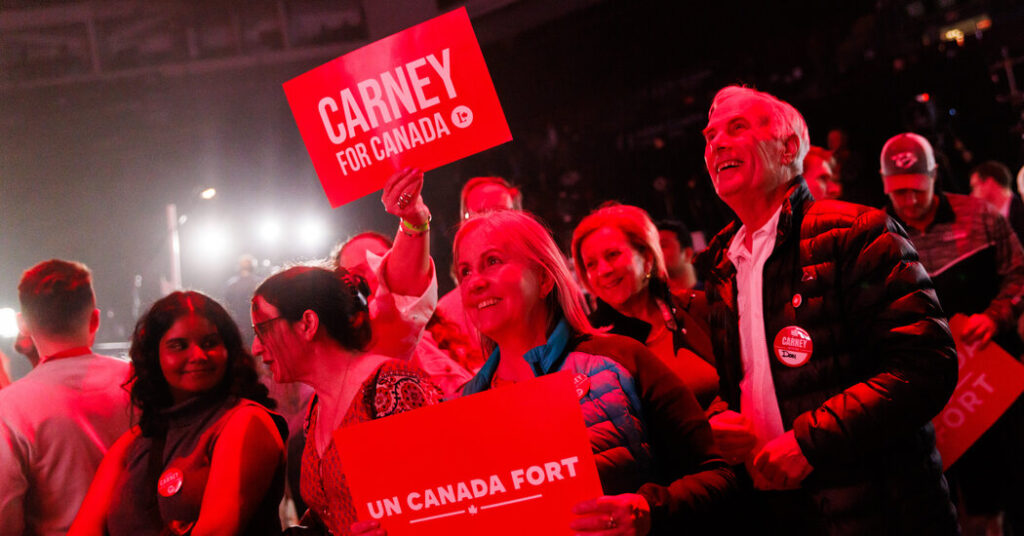On Monday night, Canadian Prime Minister Mark Carney was re-elected, according to CBC/Radio Canada. His victory is notable, especially considering the challenges faced by him and the Liberal Party, largely driven by President Trump’s tough approach to Canada.
Initial results are expected to be released by Tuesday. This decision marks an impressive turnaround for the Liberal Party, which only a few months ago seemed likely to lose to the Conservative Party, headed by veteran politician Pierre Poilievre. Mr. Carney has held the position of Prime Minister since March, following the resignation of former Prime Minister Justin Trudeau.
The election has been extraordinary in several aspects, with candidates and many voters labeling it as perhaps the most significant vote in their lifetimes.
Mr. Trump’s focus on Canada, a key ally and trading partner, has overshadowed the campaign. He has imposed tariffs on Canadian products, pushing the economy toward recession, and has even suggested annexing Canada as the 51st state. On the morning of the election, he reiterated this claim on social media, stating it would offer economic and military advantages.
At 60, Mr. Carney is a seasoned economist and policymaker who branded himself as the anti-Trump candidate, emphasizing his campaign on managing U.S.-Canada relations, which ultimately turned the tide in his favor.
Mr. Poilievre, 45, and the Conservatives have been leading the polls for years, campaigning against the Liberals and Mr. Trudeau by arguing they have led Canada into a prolonged economic downturn.
However, their lead disappeared quickly after Mr. Trump’s aggressive stance and Mr. Trudeau’s resignation.
As Canadians voted, many were concerned about their country’s relationship with the U.S. and the state of the domestic economy. Surveys conducted prior to the election indicated that affordability issues, particularly regarding housing, were top of mind.
In fact, Monday’s election acted as a sort of referendum against Mr. Trump’s treatment of allies and trading partners.
This marks the second major international election since Mr. Trump took office, following Germany, as the world closely observes Canada’s handling of its relationship with the United States.
The election also underscored that Mr. Trump’s brand of conservative politics can backfire for conservatives elsewhere if they appear too aligned with his rhetoric and ideology. Mr. Poilievre, who denounced “radical woke ideology,” vowed to cut funding for Canada’s national broadcaster and foreign aid, but this may have cost him centrist voters, as suggested by pre-election polls.
For Mr. Carney, his victory on Monday was a remarkable achievement in his swift ascent within Canada’s political landscape, having entered the race to succeed Mr. Trudeau in January.
Though a newcomer in politics, Mr. Carney is a veteran in policy-making. His composed and serious demeanor, along with his defiance against Mr. Trump’s aggressive tactics, appealed to voters who were considering the Conservatives, according to various polls and feedback from individual voters. His pragmatic and centrist approach aligned better with the current sentiments in Canada after a decade of Mr. Trudeau’s progressive policies.
There was significant evidence on Monday that Mr. Carney’s personality and background had positively influenced the Liberals’ standing. He is an economist with degrees from Harvard and Oxford, having previously served as the governor of the Bank of Canada during the 2008 financial crisis and the Bank of England during Brexit. He later took roles on corporate boards and became a prominent advocate for environmentally conscious investing.
Mr. Poilievre and other opponents attempted to portray Mr. Carney as an out-of-touch elitist, arguing that his extended time outside Canada left him disconnected from its people and culture.
They also criticized Mr. Carney for his experience working in China, highlighting the country’s interference in Canada’s elections. They claimed that some of his proposed policies would strain Canada’s public finances, making it more challenging for the economy to succeed.
Nevertheless, despite Monday’s victory, Mr. Carney and his new government face a challenging path ahead. He will need to interact with Mr. Trump and navigate his unpredictable behavior regarding Canada while addressing complex issues like trade and security.
Furthermore, he must demonstrate to voters that his credentials in economic policy can be effectively utilized to enhance Canada’s slow economic growth and high unemployment rates.


